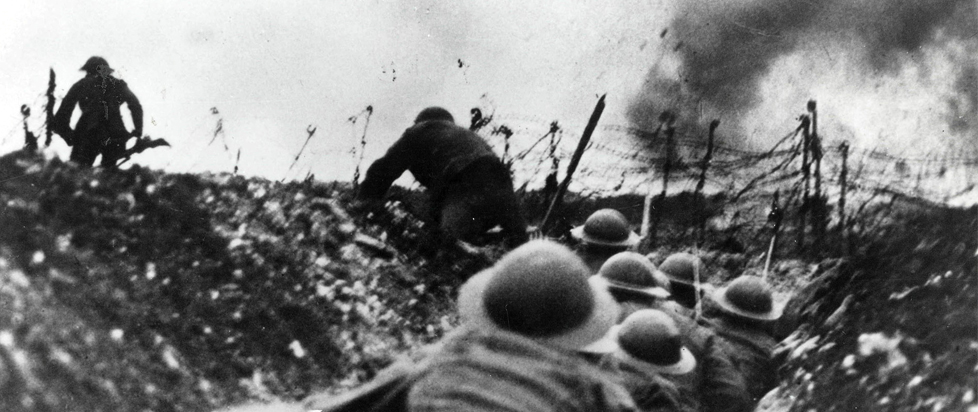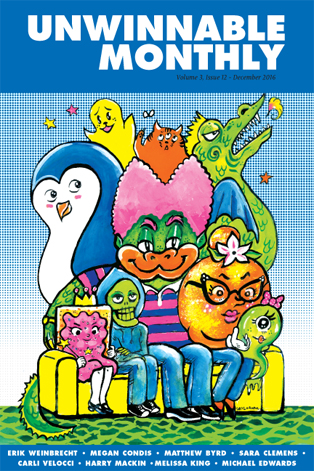
Halt the Hun! A Rebuke of Battlefield 1
 Every month in Checkpoint, Corey Milne examines how games intersect with history. This column is a reprint from Unwinnable Monthly #86, the Family issue. If you like what you see, grab the magazine for less than ten dollars, or subscribe and get all future magazines for half price.
Every month in Checkpoint, Corey Milne examines how games intersect with history. This column is a reprint from Unwinnable Monthly #86, the Family issue. If you like what you see, grab the magazine for less than ten dollars, or subscribe and get all future magazines for half price.
———
The gas masks did it. Your trusty tank Big Bess gives it her last and shudders to a halt. Her innards swarm with a violent mass of German troops. Their faces are clad in featureless masks designed to protect wearers from choking clouds of chlorine gas, a poisonous smog that was absent from the scene, yet they came forward shadowed under a grim facade. The bulging mouthpiece and dark wide lens in place of eyes serving as grotesque extensions of the classic stahlhelm’d devils. With Battlefield 1 DICE may have changed the scenery, but we’re still treading the same old mud.
Battlefield 1 is utterly routine. For a game about the bravery of fighting men, it does little more than cower in the cultural trenches, hoping no one notices it fudged its enlistment papers by masking its immaturity with bravado. To set a game during the First World War is daring, so some say. There aren’t many out there willing to touch the political quagmire of the early 20th century world and creating exciting combat scenarios around antiquated weapons would take some doing. Presumably, DICE knew this, and that might explain why they chose to ignore these aspects.
The setting serves as window dressing. Nothing more. You’ve played this same Battlefield for many years now. It’s in-game reliance on prototype, fairytale weapons is the duct tape wrapped around the modern shooter’s frame. This displays a lack of confidence in the timeframe. At a fundamental level, the developers did not believe World War I could provide a rewarding experience. To thrust bolt-action weapons upon players was the antithesis of successful design. Players cannot be trusted to embrace the unfamiliar, and so we are given an arsenal of automatic machine pistols and machine guns. To kill as we have often done.
The most damning complaint I can level at the mechanics of the game is that it is the same, dependable gameplay we’ve seen before. The worst sins are lurking in the shallow narrative trench. Bad enough that the game wastes it setting, DICE have seemingly done everything in their power to refrain from taking anything resembling a political stance. The boldest statement to come out of Battlefield 1’s campaign can be summed up as “in war people can be heroic.” Hold for applause.
The have taken an emotional route, which is to be expected. The conflict happened over a hundred years ago. In the public imagination, it has become a mythical affair, rather than a stark reality, its veterans gone, our relationship to the war changed. Remembrance Day served as a reminder that the price if war is blood. Its currency death. The poppy was a stark symbol pulled straight from the French fields. Now in Britain things are a little different. The poppy is used as an appeal to support the troops in continuous war, worn by children in T-shirts proudly sporting a “future soldier” slogan. All they’re missing is the Tom Clancy’s that usually precedes such statements.
Harry Patch, known as the Last Fighting Tommy, was Britain’s only surviving veteran of WWI before his death in 2009. He encapsulated the war in one simple statement. “Irrespective of the uniforms we wore,” he said, “we were all victims.” He had since forgiven the men he had fought against, yet that forgiveness was harder to come by when centered on the politicians who had ordered those boys to the front. There’s a lot of weight behind those words. Now let’s compare it to how Battlefield 1 opens, reminding us that “behind every gun sight is a human being.”
If this statement served to highlight the mechanical nature of modern shooting games and set up a narrative that explored the depth of human emotion in wartime, maybe it would have some weight. Instead, it hangs flaccid in the air, because here is a studio that could not bring themselves to take a firm stance one way or the other about one of the greatest tragedies in human history. We got the same old shooter. Anything stronger than that would clash with a campaign that tasks players with mowing down waves upon waves of faceless German soldiers. Only this time, they come equipped with gas masks to get the dehumanization spot on. Even in a war famous for having no clear enemy, we’re still sold the same old story.
The lack of focus on the Central Powers is what epitomizes the naked emptiness of Battlefield 1 as a cultural piece. In World War II games, there are clear and understandable reasons why you would not place players into the boots of an Axis trooper. No such excuse exists here. Other than some static text about the enemy’s bravery, the notion that there is a human behind every gun does not extended to the other side.
One of the war stories focuses on flying a bi-plane. Around this time, there was a man called Manfred von Richthofen, also known as the Red Baron. Here was the perfect opportunity to let players sit in the cockpit of the war’s most famous fighter ace. Any trepidation they’d have about shooting Allied troops could have been alleviated somewhat because you’d be shooting down planes, rather than bayoneting screaming men. Alas, even this seems too much, and instead we got some nondescript American gambler who ends up taking down a Zeppelin single handily. All thanks to the sheer bravery of his new found redemption.
A cynic would say the campaign was just training for the multiplayer. It’s not hard to see why, with each war story centering on a core Battlefield staple. Drive a tank! Fly a plane! Play as an Italian man with a permanent power up! There is no point to this other than starry-eyed heroism that supports the notion that in war people can fight bravely. There are glimpses of thoughtful writing. The two best war stories are “Nothing is Written,” in which you play a Bedouin woman fighting against Ottoman imperialism, and “The Runner,” wherein you play an Anzac trooper with a personality completely distinct from that of his English superior. Both deal with the emerging notions of nationhood that was rising within the big imperial blocks.
World War I brought about the end of traditional empires. Feelings of independent statehood only grew stronger in its wake. Let’s not forget that in 1916, when British troops were facing down Germans in France, they were also deployed on the streets of Dublin to put down rebels fighting for Irish independence. The game never takes a considered glance at any of the big issues surrounding the war. It tells you nothing about why it was fought. It doubles down on the personal perspectives of its characters, but even their motivations remain vague. They have no opinion of the war. Only that they will fight it the best they can.
DICE felt it important enough to craft these stories and I have seen far too many people laud it for its setting alone, forgiving any narrative shortcomings for the refreshment provided by new theaters. It is fluff. It peddles the same dogmatic shite we’ve already seen across a wealth of war games. We’re fighting the same enemies for the same reasons. That’s to say nothing on the absence of both the French and Russians, or the Belgians who faced down a German invasion and were perhaps responsible for getting Britain to join the war. Instead, we get not one, but two American protagonists, because of course we are.
Representation matters. As the war drifts ever further into the past, we need to be aware of how the media we consume continues to shape it. After the year we’ve had, with Brexit in the UK, the rise of the Right across Europe and Donald fucking Trump, we cannot afford to let things pass without comment. Games play a part in shaping our view of the world. They are not exempt. I know going forward into 2017, I will be less willing as a critic to let things slide by, as slight as they might be. As a writer, I can only hope that my words might at times have a small effect somewhere out there in the world, because right now that’s all I have to offer.
See you next year . . .




